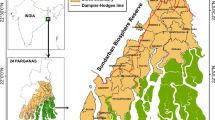Abstract
One of India’s mega deltas, the Godavari-Krishna inter delta, has abundant natural resources that are good for the growth of agriculture. However, regional limitations are also rapidly giving way to aquaculture. In the coastal districts of Andhra Pradesh, particularly in the West Godavari and Krishna districts, aquaculture is one of the land feature classes that is expanding quickly. The other land cover elements, including vegetation and built-up areas, will be negatively impacted by aquaculture’s unrestrained and indiscriminate expansion. Geographic information system (GIS) software was used to evaluate the dynamic changes in land use and land cover between 2013 and 2019. With the loss of about 650 square kilometers in both deltas, agricultural practices are changing to intensive aquaculture with an emphasis on increasing yields rather than lowering environmental quality. In the short period between 2013 and 2019, 16.5% of the agricultural land in the Godavari-Krishna delta was cleared to make way for infrastructure improvements and aquaculture. The essential components of the Godavari-Krishna delta aquaculture scenario are also highlighted in this research. The Godavari-Krishna delta is changing coastal ecology and is vividly depicted in this study.
Access this chapter
Tax calculation will be finalised at checkout
Purchases are for personal use only
Similar content being viewed by others
References
Nagaraju TV, Malegole S, Chaudhary B, Ravindran G (2022) Assessment of environmental impact of aquaculture ponds in the western delta region of Andhra Pradesh, India, Sustainability 14(20):13035
Jayanthi M, Ravisankar T, Nagaraj G, Thirumurthy S, Muralidhar M, Saraswathy R (2019) Is aquaculture abandonment a threat to sustainable coastal resource use?–a case study of Andhra Pradesh, India, with options for reuse. Land Use Policy 86:54–66
Kautsky N, Rönnbäck P, Tedengren M, Troell M (2000) Ecosystem perspectives on management of disease in shrimp pond farming. Aquaculture 191(1–3):145–161
Ahmed N, Thompson S, Glaser M (2019) Global aquaculture productivity, environmental sustainability, and climate change adaptability. Environ Manage 63(2):159–172
Yang P, Zhao G, Tong C, Tang KW, Lai DY, Li L, Tang C (2021) Assessing nutrient budgets and environmental impacts of coastal land-based aquaculture system in southeastern China. Agr Ecosyst Environ 322:107662
Do HL, Thuy TD (2022) Productivity response and production risk: a study of mangrove forest effects in aquaculture in the Mekong River Delta. Ecol Econ 194:107326
Muralidhar M, Kumaran M, Jayanthi M, Syama Dayal J, Ashok Kumar J, Saraswathy R, Nagavel A (2021) Impacts of climate change and adaptations in shrimp aquaculture: a study in coastal Andhra Pradesh. India. Aquatic Ecosyst Health Manag 24(3):28–38
Giri S, Daw TM, Hazra S, Troell M, Samanta S, Basu O, ... Chanda A (2022) Economic incentives drive the conversion of agriculture to aquaculture in the Indian sundarbans: livelihood and environmental implications of different aquaculture types. Ambio, 1–15
Latha PS, Rao KN, Kumar PV (2022) Hydrochemical evaluation of subsurface water in the aquaculture region of coastal India using multivariate statistics, GWQI and GIS. Int J Energy Water Resour, 1–21
Trang NTT, Loc HH (2021) Livelihood sustainability of rural households in adapting to environmental changes: an empirical analysis of ecological shrimp aquaculture model in the Vietnamese Mekong Delta. Environ Dev 39:100653
Nagaraja R, Kumar R, Kesava Rao P, Ravishankar G, Saxena M, Tejaswini V (2021) IRS-1C applications in land use/land cover studies: indian experience. J Indian Soc Remote Sens 49(1):97–109
Author information
Authors and Affiliations
Corresponding author
Editor information
Editors and Affiliations
Rights and permissions
Copyright information
© 2024 The Author(s), under exclusive license to Springer Nature Singapore Pte Ltd.
About this paper
Cite this paper
Nagaraju, T.V., Rambabu, T., Mantena, S., Sunil, B.M. (2024). Dynamics of the Aquacultural Intensification in the Godavari-Krishna Inter Delta Region in India and Its Impact on Ecological Balance. In: Nagabhatla, N., Mehta, Y., Yadav, B.K., Behl, A., Kumari, M. (eds) Recent Developments in Water Resources and Transportation Engineering. TRACE 2022. Lecture Notes in Civil Engineering, vol 353. Springer, Singapore. https://doi.org/10.1007/978-981-99-2905-4_12
Download citation
DOI: https://doi.org/10.1007/978-981-99-2905-4_12
Published:
Publisher Name: Springer, Singapore
Print ISBN: 978-981-99-2904-7
Online ISBN: 978-981-99-2905-4
eBook Packages: EngineeringEngineering (R0)




